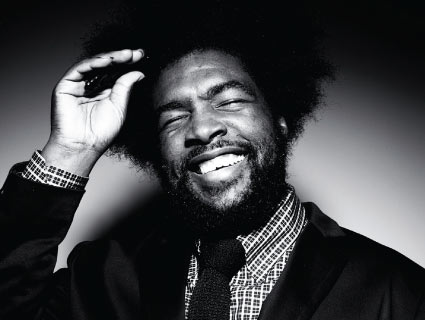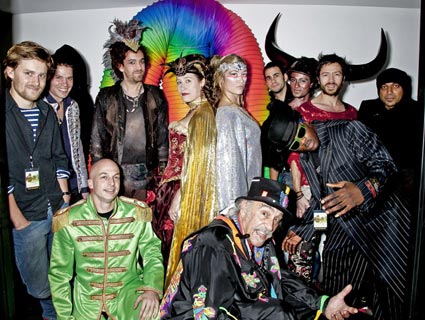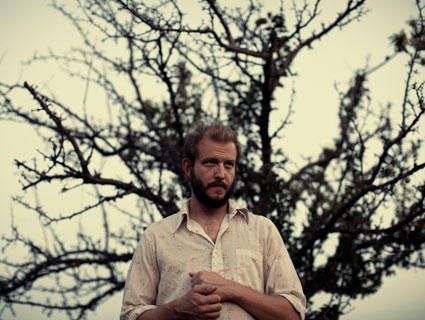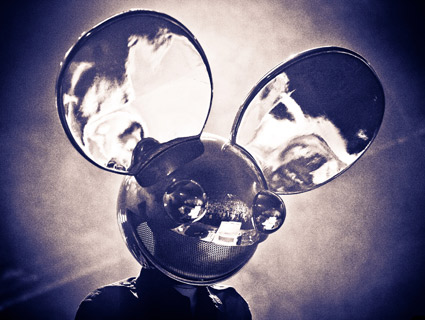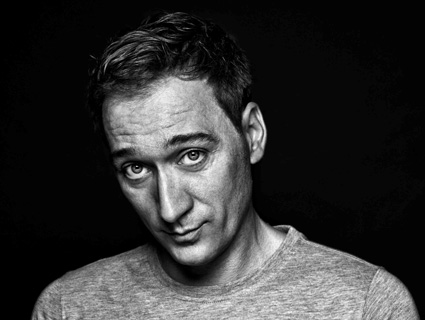
Photo: Christoph Kostlin
DJ and producer Paul van Dyk, or PvD, as fans call him, has been at the forefront of the electronic dance music scene ever since it emerged back in the early 1990s. When today’s EDM it-boys, like Deadmau5 and Skrillex, were practically still in diapers, van Dyk was DJing in Europe, shaping the new genre’s ever-evolving sound. Two decades later, he’s still one of EDM’s reigning superstars, ranking 11th on DJ Mag’s 2011 poll of the world’s Top 100 DJs, where he’s held top spots since 1997, when the polling began.
Raised in East Berlin when Germany was still divided, van Dyk couldn’t even buy vinyl records; he had to covertly listen to banned radio stations and smuggled cassette tapes. Growing up under an oppressive regime instilled in him a love for democracy and a compulsion to share his democratic ideals—even if his smack talk once got him kicked out of Venezuela.
While PvD tours at a relentless pace—120 to 130 shows a year, he says—his new album, Evolution, due out in March, will be his first new release in four years. “This album is called Evolution for a reason: It’s developing my idea of how electronic music should sound in a further way and in a further direction,” he says.
With only 45 minutes left to go before 2011 turned to 2012, I retreated from the thumping sound system at the White Wonderland NYE Festival in Anaheim, California, to van Dyk’s dressing room. As he consumed his pre-show drug of choice (coffee, black), we talked Occupy Wall Street, the humorous side of Fox News, and how he got into trouble with Hugo Chavez.
Mother Jones: Happy New Year! How many new years have you spun into existence by now?
Paul van Dyk: 19
MJ: Wow, you know the number? Any notable ones?
PvD: There have been some special places: the big Don Valley stadium in the UK, and then three years ago we had 1.3 million people in Brazil at the beach. Then again, I think we’ve had the most of them in LA—this is my fourth New Year’s Eve in the LA area.
MJ: Is EDM just way more popular in certain cities?
PvD: The good thing, really, is that electronic music started as a fringe subculture, and now it’s the biggest youth culture in the world. People pretty much everywhere go crazy for electronic music. You have Berlin with a certain vibe; you have New York; you have Miami, LA, London, Paris, Singapore, Tokyo: Each has different elements, but it’s all really exciting.
MJ: Given your touring schedule, it’s amazing you have time for other things. You often talk about philanthropy and politics, things that aren’t typically associated with EDM artists. What drives these interests?
PvD: I grew up in a dictatorship, so I really appreciate democracy. I think democracy isn’t just a random thing that’s around—a democratic society needs the involvement of everybody. I always say, “If you see something is wrong in your neighborhood, go ahead and change it. Don’t wait for somebody else to do it.” This is pretty much what I do.
MJ: What specific issues do you have a passion for?
PvD: Mainly education programs for kids from unfortunate family backgrounds. I’m really trying to help this, and I have my own charity organization in Berlin called Ruckenwind, which supports kids from—ya—not ideal backgrounds.
MJ: Do you find the immigrant population in Germany is especially affected?
PvD: The immigrants we have in Germany seem to sort of stay in their isolated world, and a lot of the kids don’t speak German even though they were born in Germany. So you try to teach them something, but they don’t even understand the language. So yeah, it is a big issue, but it’s also across the board. There are quite a range of people who need help.
MJ: You’ve talked about EDM as a tool that can unite people in democracy—even on opposing sides of a border. Will you elaborate?
PvD: It’s just like this: If you look down [from the stage], you see so many different people coming together. They all believe in a different god. They all come from different parts of the world. And they’re still all together, very peacefully having a good time. And that positive energy is something we should capture and try to bring to our everyday lives.
MJ: Is there any place you wouldn’t play because you disagree so strongly with their repressive government policies?
PvD: No, I think it’s the other way around: going there and showing them how open-minded and how democratic electronic music is and then raising my voice. I remember doing a show in Venezuela, and basically I was escorted out of the country by the secret police after the show.
MJ: Why?
PvD: I was saying in interviews how Chavez is basically a dictator. He’s not a socialistic people’s leader. He’s a dictator; it’s a fucking dictatorship. And I told them, they should vote against this guy; they should try to get rid of him. Because it’s a democratic country, and he just took over with the power that he had. And I guess there was a dangerous element to [saying] it, but you know—I’m still alive. [Laughs.]
MJ: Do you think Venezuela would ever let you come back?
PvD: I don’t think they would let me in, to be honest. You know, I have a responsibility to my family, and I sort of put myself in unnecessary danger. But the thing is, I really believe that I should go to these places, purposefully. I really strongly believe it had to be said.
MJ: Where do you call home at the moment, by the way?
PvD: Berlin. And I’m pretty much a homey. Always, I fly out and I fly straight back. I’m going straight back tomorrow.
MJ: Have you been following the Arab Spring and the Occupy Wall Street movement?
PvD: The Arabic Spring, I don’t really think that people really thought everything all the way through, and what’s going happen. If you look at Egypt, it’s one of the first countries freed and it’s now collapsing again. Because if people take some sort of dictatorship—some sort of structure—away, you need to fill the gap with something. If you don’t really do that with the support of international affairs or whatever, then obviously the extremists go in. This is why the Muslim Brotherhood actually won the major part of the election. So if [Egypt] would be really democratic now, then it could become a country like Iran. And that’s not really in the interest of a free democratic society at all. So we should really look at it, and what’s going to happen, and help and support.
In terms of the Occupy movement, I’m not really agreeing with them that much, to be honest. Because first of all, there’s no clear statement of what they actually want. They’re just against everything. That’s pretty much the picture they show. The next thing, the thing you see on television, is they actually stand in the way while other people try to go to work. And the next thing is you see them throwing stones at policemen. I don’t agree with that. And don’t agree with the [idea] of the whole banking and financial sector being bad. Because at the end of the day, without banks, young families wouldn’t have the possibility of actually getting a loan and buying a house. Young entrepreneurs with crazy cool ideas wouldn’t have gotten the money to start their own businesses. So [banks] do a lot of very good things for society. What we need is regulation for those greedy motherfuckers at Wall Street, and that’s something very, very different.
MJ: So where should they be protesting?
PvD: Well, they should protest but they should be pragmatic. They should actually make a point, rather than just “occupying.” That doesn’t help. You need to go and actually make sure—you know, we need those rules; we need regulations. The German government has been pushing those regulations for years now, and in Europe it’s the Brits who always say, “No, we can’t do that.” And on the international level, it’s the American government that says, “No, we can’t put any regulations in.” So this is why you have to demonstrate: Go to your government and tell them, “Put fucking regulations in place.” Not to Wall Street. That doesn’t change anything. That basically makes you look stupid, to be honest.
MJ: So where do you get your news?
PvD: Well, I’m reading a lot of different sites. We have a very well set up press in Germany, from all the different angles—left wing all the way to the other corner. And this is what I’m reading a lot, and where I get a lot of different information. When I’m traveling, I’m always watching CNN. And sometimes when I’m in America I’m watching Fox News because it’s like a comedy channel. [Laughs.] It’s so fucking funny. You know, for a European watching that, it’s just hilarious.
MJ: So as a producer and label owner, where do you see electronic music headed? You know, they’re mixing electronic music—or some kind of version of it—into Top 40 songs nowadays.
PvD: “Some kind of version” is a good way of putting it. I don’t even consider that electronic music. It’s danceable pop music, and it doesn’t have any roots in our world. I don’t want to be affiliated with it and I’m not associating myself with that sort of stuff or those DJs—if you want to call them that. But you know, let them do their thing. A lot of people enjoy it, so fair enough. It’s not down to me to criticize it. On the other hand, what I call the core electronic scene is so strong and so massive, we don’t need pop; 2011 was a great year. There was phenomenal electronic music coming out.
MJ: Who did you love?
PvD: Think of someone like Arty, who came up with his own way of putting things together. And many more: There’s Tyler Michaud, and Austin Leeds is doing phenomenal stuff. It’s good; it’s really good.
MJ: You’ve been doing this for a while now. Originally, your music was considered trance, but I’ve read that you no longer like to identify your music that way.
PvD: Well, it’s not that. When you listen to my music, it’s not just stereotypical trance music. It’s just not. It’s as much electro as it is techno as it is drum and bass—there are just so many different elements that combine to create what people call “the PvD sound.” I think an English colleague of yours, he once wrote, “To call PvD a trance DJ is just cheap journalism.”
MJ: So, with half an hour left in 2011, I should ask: How did this year treat you? One of your fans on the floor told me he and his friends have been wondering where you’ve been since 2007.
PvD: Well, I’ve been traveling a lot and doing a lot of work. Now the album is finally finished and coming out, so I’m really excited.
MJ: What aspect are you most excited about? And who did you most enjoy collaborating with?
PvD: I enjoyed collaborating with all of them. A collaboration is something that I choose, and not something that a manager tells me to do for marketing purposes. So I worked with Arty; I worked with Austin Leeds; I worked with Adam [Young] from Owl City.
MJ: His music typically plays on rock stations. What made you seek him out?
PvD: He has a very distinctive sound. He’s very unique, and he does what he does with his heart. So when these worlds collide in the studio, something cool is happening.
MJ: What other art forms inspire you?
PvD: Really, everything. The whole life in general.
Click here for more music features from Mother Jones.
